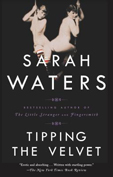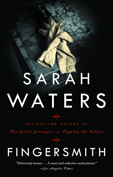Harry Perrin wrote for us at the beginning of July this year, suggesting that there will always be an appropriate time to dip into a book that has been languishing on a shelf. This week he sifts through those books to select a couple by Welsh novelist Sarah Waters and introduce us to her writing:
 Sarah Waters’ first novel Tipping the Velvet was published in 1998. It won her a Betty Trask Award, was various journals’ ‘book of the year’, and has been adapted into a successful BBC serial.
Sarah Waters’ first novel Tipping the Velvet was published in 1998. It won her a Betty Trask Award, was various journals’ ‘book of the year’, and has been adapted into a successful BBC serial.
I love it too. It’s the story of Nan Astley, an ‘oyster girl’ from Whitstable who makes it big in the music halls of Victorian London.
“Have you ever tasted a Whitstable oyster?” the book begins. “If you have, you will remember it.” Oysters permeate the early sections of the book. You can smell the sea air; taste ‘Astley’s Oysters: the best in Kent’. And this unusual, sensuous foodstuff plays an important role in the beginnings of a love affair between Nan and her music hall idol Kitty Butler.
Nan and Kitty eventually become a double act and move from regional music halls to London theatres. There’s something enticing about an amateur being taken under the wing of a pro and thriving, like Baby in Dirty Dancing or non-dancers learning to jive in Strictly Come Dancing. I got the same thrill here, and by the time Nan has made it – loyal, big-hearted, misunderstood Nan – there’s bags of good will stored up so I was really rooting for her when she falls on much harder times. I won’t elaborate, save to say that they’re much harder times, and I wondered at points – with tightly crossed fingers and an inability to put the book down – how she’s going to get out of various fixes.
 Fingersmith, a subsequent Waters novel published in 2002, also won high acclaim (it was shortlisted for the Booker and the Orange Prize) and was also adapted into a BBC serial. Like Tipping the Velvet, it’s a bildungsroman: a novel charting the journey from innocence to experience – a sexual awakening, but also awakenings in other areas of life too – of its protagonist. Like Tipping the Velvet, it challenges hetero-patriarchal norms, against the backdrop of Victorian England.
Fingersmith, a subsequent Waters novel published in 2002, also won high acclaim (it was shortlisted for the Booker and the Orange Prize) and was also adapted into a BBC serial. Like Tipping the Velvet, it’s a bildungsroman: a novel charting the journey from innocence to experience – a sexual awakening, but also awakenings in other areas of life too – of its protagonist. Like Tipping the Velvet, it challenges hetero-patriarchal norms, against the backdrop of Victorian England.
Susan Trinder is our protagonist here, young and loyal to a fault. She lives with Mrs Sucksby and Mr Ibbs, who raised her, in a ‘den of thieves’, complete with a colourful Dickensian cast of characters. But she’s soon to leave, to play her part in the thieves’ bigger plan. Waters reveals aspects of this plot, layer by layer, very gradually. It’s a super slow build – Le-Carré-esque and full of eerie tension – to a merciless plot twist part-way through the book.
More twists follow, intertwining with a doppelgänger dynamic and an unsettling, Gothic style. It’s all very destabilising, and builds the tension brilliantly.
It’s more than a crime novel, and both it and Tipping the Velvet are more than historical novels, bildungsromans or lesbian fiction. They’re all these things and more. The plot, the characters and the prose are all so engaging. I can’t recommend them enough.
If you would like to find out more about Sarah Waters, here is her page on the British Council site.